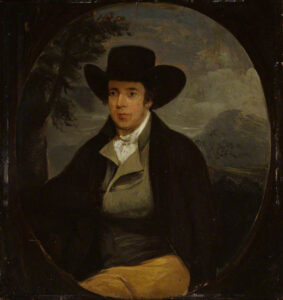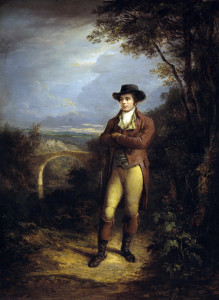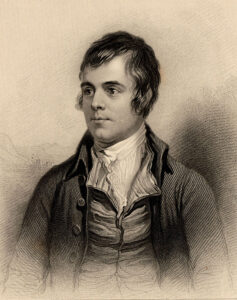We began the month singing “Auld Lang Syne” as New Year’s Eve welcomed in a new year, and now, close to January’s close, we get to sing it again. It is Burns Night: the night we celebrate the birth of Scottish poet Robert Burns. Rabbie Burns wrote many songs, and there is nothing in particular about “Auld Lang Syne” that makes it a New Year’s song, and yet it has fallen into place there at the start of the year. And as much as we tend to think of the new year as a time to look ahead, January, named for the Roman god Janus, who looks both forward and backward, has long been seen as a time for remembering. This is what Rabbie Burns’ song is all about, for the words auld lang syne translate essentially to old long since, or old times.
Should auld acquaintance be forgot,
and never brought to mind?
Should auld acquaintance be forgot,
and auld lang syne?
- For auld lang syne, my jo,
for auld lang syne,
we’ll tak a cup o’ kindness yet,
for auld lang syne.
And there’s a hand, my trusty fiere!
and gie’s a hand o’ thine!
And we’ll tak a right gude-willy waught,
for auld lang syne.
And it is right, I think, and it is good, to spend some of our time in this act of remembering: of putting things back together (re-membering: re-connecting). Especially tonight, when we remember Robert Burns and all those who love him. He was a sentimental poet, Robert Burns, and for those of us who love poetry, or who love Rabbie Burns, or even those of us who love Christmas, for soon the Yuletide greenery and lights must come down as we approach Candlemas Eve and St. Brigid’s Day… we come to a time in the Wheel of the Year where we might get a bit sentimental ourselves. But we need this on occasion: a cup o’ kindness, and the laughter and the tears that come with remembering.
And so it was the 25th of January in 1759 at Burns Cottage at Alloway in Scotland that Robert Burns was born. He did not live a long life, alas, but in 1801, five years after the poet’s death, the first recorded Burns Night supper was celebrated. It’s been celebrated around the world all these years since: people gathered ’round a table for a meal and for drinks (sometimes many drinks) and for readings and recitations of the Bard of Scotland’s poetry, and yes, to remember. And as each Burns Night supper concludes, with one more toast of whisky, all join hands and sing “Auld Lang Syne.” To be sure, there are worse ways one might spend a cold winter’s night.
A word to the wise: One week from tonight, from Burns Night, it will be Candlemas Eve, and if you have been joining us in celebrating a Slow Christmas, Candlemas Eve is the night when, traditionally, all vestiges of the Yuletide greenery are to be removed. Candlemas Eve comes at the close of St. Brigid’s Day, and it is Brigid who bridges us from winter toward spring. Plan accordingly!
SHOP OUR VALENTINE SALE!
At our online catalog right now use discount code LOVEHANDMADE to save $10 on your $85 purchase, plus get free domestic shipping, too. That’s a total savings of $19.50. Spend less than $85 and our flat rate shipping fee of $9.50 applies. If you’ve not taken a look lately at what Convivio Bookworks has to offer, I think you’ll be pleasantly surprised at what you’ll find here… plus you know we appreciate your support immensely. CLICK HERE to shop.
Image: “Robert Burns” by Peter Taylor. Oil on panel, circa 1787, National Galleries Scotland [Public domain] via Wikimedia Commons.


